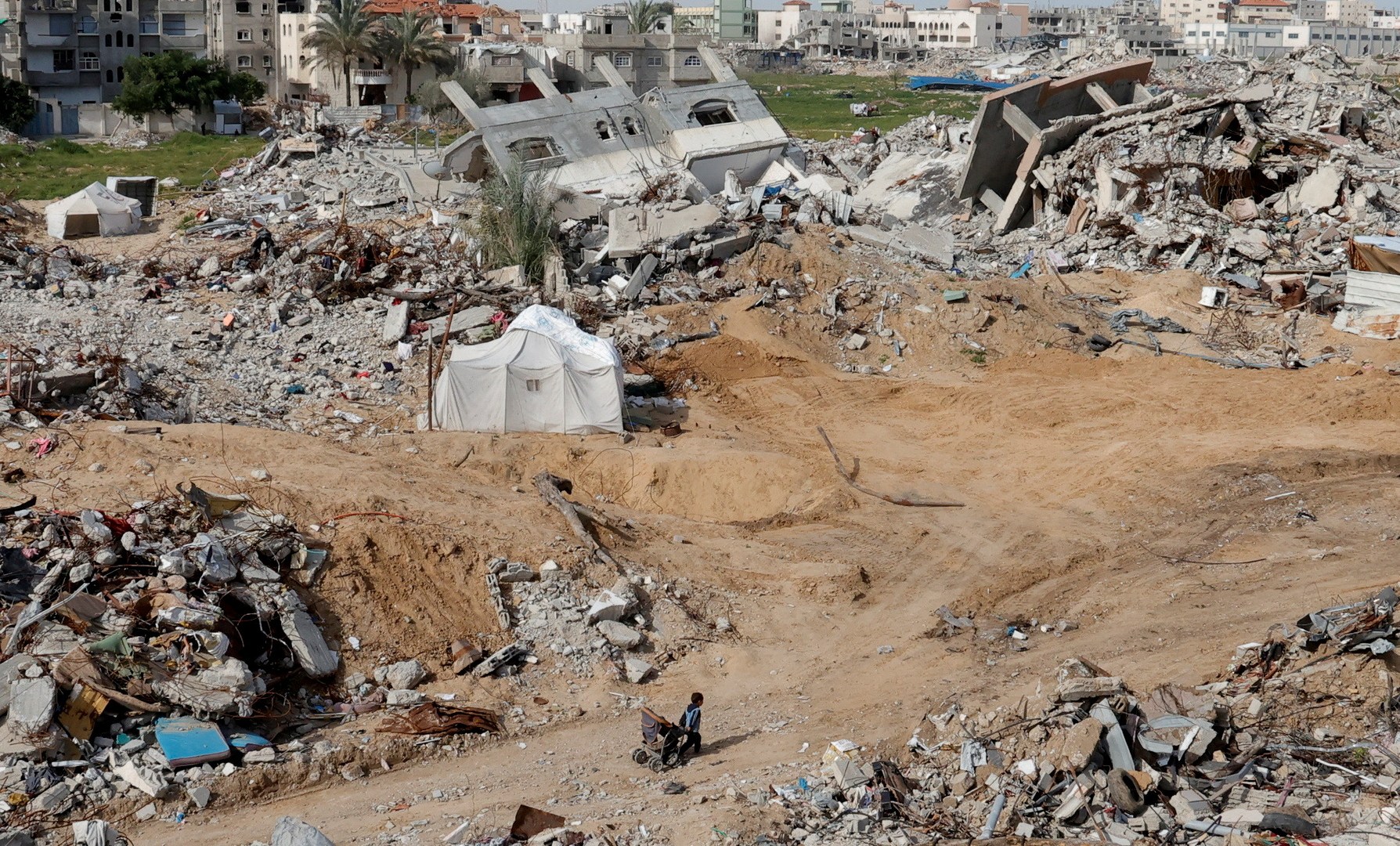Two prominent Israeli politicians have criticised plans by the government of Prime Minister Benjamin Netanyahu to set up what it calls a “humanitarian city” in southern Gaza, saying the proposal would amount to interning Palestinians in a “concentration camp”.
Former Prime Ministers Yair Lapid and Ehud Olmert levelled the criticism on Sunday as Israeli forces continued to bombard Gaza, killing at least 95 Palestinians over the course of the day.
Lapid, the leader of Israel’s biggest opposition party, told Israeli Army Radio that “nothing good” would come out of the plans to establish the “humanitarian city” on the ruins of the city of Rafah.
“It’s a bad idea from every possible perspective – security, political, economic, logistical,” he said.
“I don’t prefer to describe a humanitarian city as a concentration camp, but if exiting it is prohibited, then it is a concentration camp,” he added.
Lapid served as Israel’s prime minister for six months in 2022.
According to the Israeli government, the “humanitarian city” will initially house 600,000 displaced Palestinians currently living in tents in the overcrowded area of al-Mawasi along Gaza’s southern coast. But eventually, the enclave’s entire population of more than two million people is to be moved there.
Satellite images have shown Israeli forces have stepped up demolition operations in Rafah in recent months. On April 4, the number of destroyed buildings stood at about 15,800. By July 4, the number had gone up to 28,600.
Olmert, who served as Israel’s prime minister from 2006 to 2009, also slammed the Israeli plan.
“It is a concentration camp. I am sorry,” he told the United Kingdom’s Guardian newspaper.
“If they [Palestinians] will be deported into the new ‘humanitarian city’, then you can say that this is part of an ethnic cleansing,” he said. “When they build a camp where they [plan to] ‘clean’ more than half of Gaza, then the inevitable understanding of the strategy of this [is that] it is not to save [Palestinians]. It is to deport them, to push them and to throw them away. There is no other understanding that I have at least.”
Ethnic cleansing
Humanitarian officials also have said the plan for the internment camp in Rafah would lay the groundwork for the ethnic cleansing of Palestinians from Gaza.
Philippe Lazzarini – head of the United Nations agency for Palestinian refugees, or UNRWA, which has been banned by Israel – asked last week if the plan would result in a “second Nakba”. The term refers to the expulsion of hundreds of thousands of Palestinians from their homes during the 1948 establishment of the state of Israel.
“This would de facto create massive concentration camps at the border with Egypt for the Palestinians, displaced over and over across generations,” Lazzarini said, adding that it would “deprive Palestinians of any prospects of a better future in their homeland”.
The Israeli government insisted the transfer of Palestinians to the internment camp in Rafah would be “voluntary” while Netanyahu and United States President Donald Trump have continued to tout their proposal to forcibly transfer all of the Palestinians in Gaza out of the enclave.
Netanyahu said during a dinner with Trump last week that Israel was working with the US “very closely about finding countries that will seek to realise what they always say, that they want to give the Palestinians a better future”.
For his part, the US president said “we’ve had great cooperation from [countries] surrounding Israel” and “something good will happen” soon.
Israel’s neighbours and other Arab states, however, have roundly rejected any plans to displace Palestinians from Gaza, and so have the war-weary Palestinians of the coastal enclave.
The Reuters news agency, meanwhile, has reported that the Gaza Humanitarian Foundation (GHF), a private US- and Israeli-backed group distributing aid in Gaza, had floated plans to build large-scale camps called “humanitarian transit areas” inside and possibly outside the Palestinian territory.
The proposal, created sometime after February 11, outlines a vision of “replacing Hamas’ control over the population in Gaza” with the GHF describing the camps as places where Palestinians could “temporarily reside, deradicalize, re-integrate and prepare to relocate if they wish to do so”, according to Reuters.
The GHF is the main group that the Israeli military currently permits to distribute food in Gaza.
The group had set up four distribution sites in southern and central Gaza but currently operates a single point near Rafah. Since its operations began at the end of May, Israeli forces have killed at least 800 Palestinians seeking aid at the GHF’s sites.
Israel wants the GHF to supplant the United Nations in Gaza and take over all aid operations.
Human rights groups and experts say the GHF is also part of Israeli plans to push the Palestinian population to the south and eventually out of the Gaza Strip.
Omar Rahman, a fellow at the Middle East Council on Global Affairs, told Al Jazeera that the killings at the GHF sites and now the plan for the internment camp make it clear that “Israel’s ultimate goal here is the physical destruction of Gaza, the engineered collapse of Palestinian society there and the forcible depopulation of the entirety of the Strip.”
He said Israel’s plan was to concentrate the Palestinian population and put “pressure on them so their choice on a daily basis is between starvation and being shot”.
Source: Aljazeera

Leave a Reply